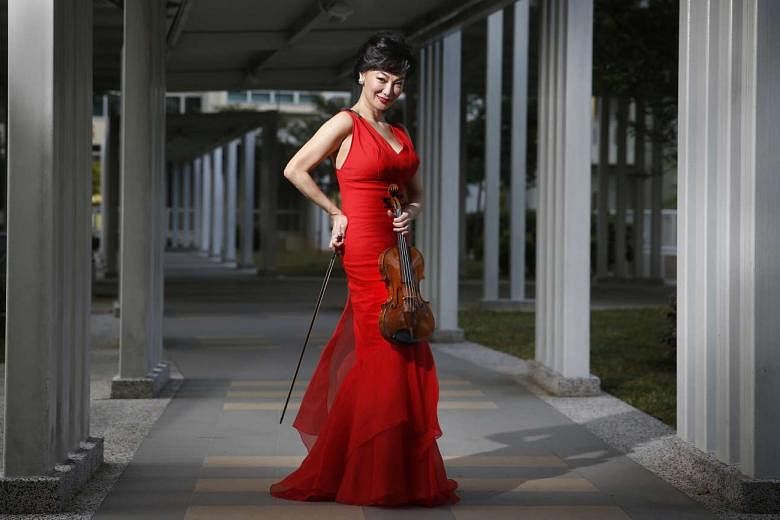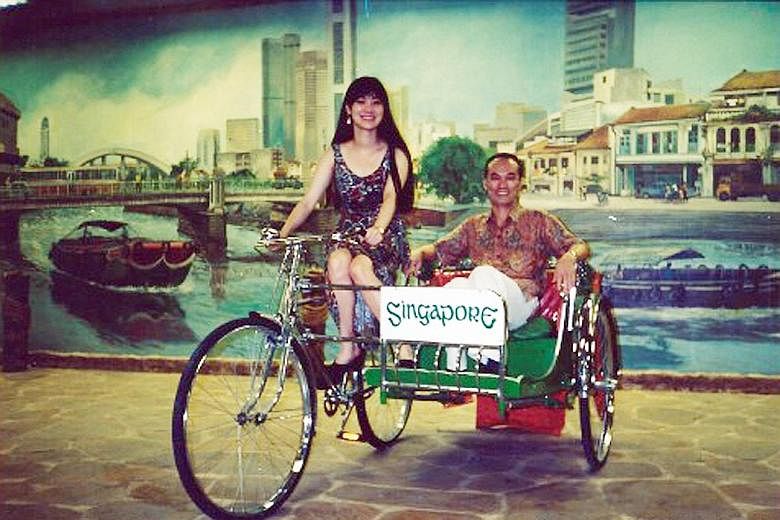Three years ago, Siow Lee Chin flew home from the United States to see her father, who was debilitated by advanced Parkinson's disease, in Tan Tock Seng Hospital.
Painfully thin, he was unable to recognise his eldest child, one of Singapore's most famous violinists.
"I had brought along my violin and, instinctively, I played him his favourite piece - Jeanie With The Light Brown Hair," she says, referring to the signature encore piece of legendary violinist Jascha Heifetz. A strange thing happened. Tears started rolling down her father's cheeks. "I thought, 'Oh dear, I'd made my dad very sad'. But the nurses told me it was a good thing because he had not reacted to anything for weeks."
Over the next few days, she played for her father, Mr Siow Hee Shun, a former violinist with the Singapore Symphony Orchestra (SSO) and her first teacher. He died soon after, aged 78.
But playing for him in his final days affected her profoundly. "He was lost because of his illness. But the violin not only connected me to him, but also him with himself and with the present," she says.
This, and other episodes, changed her views on music. "When I was younger, it was about getting into big gowns, great concerts and playing with A-list orchestras. But it's more than that; more than a career.
"It's a gift and a powerful connector. It teaches us how to hope, how to get up when we fall down, and connects the past and present. It is not grandiose, I've experienced it," adds the 48-year-old professor of violin and director of the strings programme at the College of Charleston in the United States .
However, she is still in the process of finding out what more she needs to do with this gift and what it means in the grand scheme of things. "It's all part of the wonderful trip we call life," she says.
As trips go, her life has been an eventful journey. Her virtuosity with the violin saw her, at the age of 15, become the first Singaporean admitted to the world-renowned Curtis Institute of Music in Philadelphia. It also led to a slew of awards and a jet-setting career with performances in venues such as New York's Carnegie Hall and London's Royal Albert Hall.
There have also been tribulations, including a fight with cancer and a car accident which broke her arm and threatened to end her career. She has documented her trials and triumphs in an autobiography, From Clementi To Carnegie, which hits bookstores on Tuesday.
Droll and charming, with a throaty laugh and a husky voice, Siow says she owes a lot to her father, a quiet dignified man with a traumatic childhood.
He was eight during World War II when Japanese soldiers killed his parents, bayoneted him and left him for dead. He survived and developed a love for classical music in his teens, saving assiduously to buy himself a violin and teaching himself to play it. Working as a salesman, he then took lessons from the late Goh Soon Tioe - a pioneering violinist and music teacher - before becoming a professional musician.
He was good enough to earn a scholarship to study in England, but he decided to marry and become a music teacher and a violinist with the SSO. Siow is the eldest of his three children. Her mother is Madam Choong Siew Kum, and younger brothers are Yew Nam, a doctor, and Yew Mun, an IT professional.
"My father bought me a violin when I was just three months old but I made him wait until I was seven years old," says the former student of Anthony Road Girls' Primary and Raffles Girls' Secondary. "I showed no interest. He was sneaky, he would take me along when he gave music lessons and when I saw how much fun the others were having, I wanted in on the action."
She was a natural, getting her Associated Board of the Royal School of Music Grade Eight qualifications in three years when most people take more than 10. She took part in her first competition when she was eight and, at 12, became the SSO's youngest trainee, filling in when the orchestra was short of players.
"My father was a tough teacher who believed in honest to goodness hard work. He never allowed me to form bad habits," she says, adding that she took many masterclasses conducted by visiting musicians.
One such masterclass by visiting American violinist Aaron Rosand changed her life. "When he asked me to play for him, I asked if I could warm up. Instead of doing a scale, I did a very difficult cadenza and, once I started, I couldn't stop."
Unknown to her, Rosand was also recruiting for Curtis. He offered Siow a full scholarship on the spot. "It might have been a big feather in my cap, but it was probably a bigger one for my dad.
"He was my teacher from Day One. He was the unsung hero."
Even with a full scholarship, going abroad was a big financial burden on her family. Fortunately, Lady Yuen-Peng McNeice - wife of Sir Percy McNeice, Singapore's first president of the City Council - agreed to sponsor her living and travel expenses.
"It's dad's karma. He was such a good teacher to so many students. One student's father was the pastor at Lady McNeice's church. When he heard about my scholarship, he spoke to her," she says.
Siow left for Philadelphia in 1983 when she was 15. She spent six years in Curtis and life there was far removed from her family's four-room Housing Board flat in Clementi. "It's a very elite school, very posh, with gorgeous oriental rugs, beautiful lamps and little geniuses from all over the world."
Her memories include playing in Carnegie Hall in her second year, and working with legendary conductors such as Leonard Bernstein and Riccardo Muti.
After Curtis, she packed her bags for New York to develop her career and get her master's in music at the Mannes College of Music. She won several competitions, including the Artists International Young Artist Competition and, in 1991, scored a solo debut at Carnegie Hall.
Life, however, was far from rosy. She had to play at weddings and in the orchestra pits of Broadway theatres to make ends meet. "I didn't like my life in New York during that period. It was a rat race. I was a musician, but wasn't living like one. I was just hustling from gig to gig."
She gave herself four years to make a name for herself and to get better, so she decided to study under Roland and Almita Vamos at the Oberlin College and Conservatory in Ohio. The husband and wife have won many honours for violin instruction. Friends told Siow that she was nuts to leave New York for the American Midwest, but she reckons it was the best decision she ever made. "I was not distracted, I was serious and I never practised more in my life," she says.
It was not all smooth sailing. She failed at a couple of competitions, including the International Tchaikovsky Competition in Moscow in 1994. The wealth divide she saw in Moscow also made her angsty.
What was the point of it all, she asked herself. She did not take her violin out of its case for nearly three months. But with the encouragement of Mrs Vamos and many friends, she stopped moping and took part in the 1994 Henryk Szeryng International Violin Competition in Mexico and clinched gold with Tchaikovksy's Violin Concerto. That episode taught her a lesson she now tells all her students.
"Losing was a great motivator which helped me to win. What matters most is how you pick yourself up again."
A heady career followed, one which saw her averaging 70 performances yearly to crowds ranging from 6,000 to 60,000. She later became an artist-teacher, taking up a tenured position at Charleston more than 10 years ago. She still gives about 30 performances a year.
Last month, she played at the South-east Asia Games opening ceremony and, earlier this month, she premiered Air - specially written for her by acclaimed composer Yao Chen - at the 2015 City of London Festival. Her career, she says, has not made her super wealthy. "But I eat well, travel well. I've met very distinguished people - presidents, heads of state, celebrities - and I've made friends, and still do, in many corners of the world."
There have been sacrifices. "I've missed birthdays and Chinese New Years and quality time with my family, and they with me. But it was a choice I made."
Romantic relationships have also suffered. "It takes a special person to understand my needs. I'm independent and I don't lead a conventional life. But I have no lack of admirers," she says, with a squeal.
"I do have someone in my life now, I'm not lonely," she adds, but declines to say more.
Four years ago, her life was rocked by several upheavals. While back for a visit in 2011, her brother noticed that her thyroid was unusually large and advised her to see a doctor. It took visits to three specialists before she was diagnosed with thyroid cancer. She underwent surgery and radiotherapy before being given a clean bill of health.
Several months later, however, a car accident left her with a broken left arm. "Two big bones were broken. Psychologically, it was a huge blow," she says. "I thought it was the end of my career."
Throwing in the towel, however, was not an option. Siow - who now has two titanium rods in her left hand - clawed back, painfully but surely. For months, she struggled with the most mundane of tasks, such as typing and showering. Even playing a scale was torturous, let alone a melody.
It was sheer determination which helped her regain her dexterity.
She was still recovering when she was hit by the deaths of two people close to her - Lady McNeice and her father - in the space of six months. "It sounds cliched but what I went through made me see things in a bigger context and showed me what is truly important," she says.
Three months after her father died in December 2012, she took up a professorship at the Soochow University School of Music in China, with the blessings of Charleston, which gave her leave of absence. "I saw it as a positive omen, a new direction," she says. "It was the first time I'd moved to the East."
The two years in Suzhou have been good for her, she says. She threw herself into teaching and mentoring young students, even organising a China-Singapore Young Talents Competition last year. And she wrote her autobiography, which she hopes will inspire young people to pursue their dreams.
That stint is now up and she returns to Charleston next month. But she will still be involved in many projects in China.
She does not know what the future will bring but as she writes in her book: "I have learnt that when things fall apart, they will come together again."




